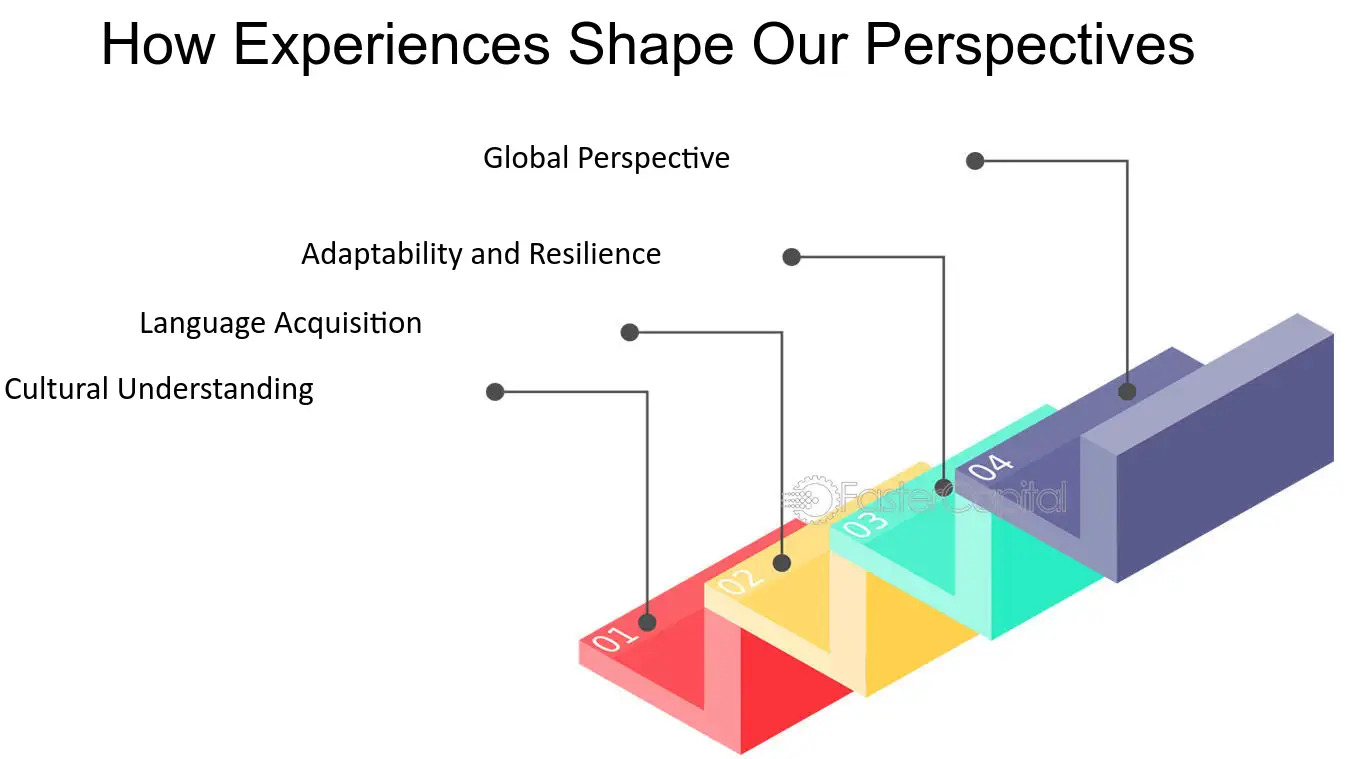Cultural experiences: Ever experienced an aha moment.You know that instant when something you didn't understand the first time around suddenly becomes crystal clear to you and you realize you understand everything about the situation? A lot of individuals here have probably experienced it. That "oh ah! this is it, yeah?" emotion is probably something that we can all identify with. I especially recall one of my strongest "oh, ah, so this is it" moments. It took place a few months ago. I was thinking about how my friends were my main source of trouble in college.How Do Cultural Experiences Shape Identity And Perceptions There were many joyful moments, growing experiences, and lessons learned, but there were also many arguments, setbacks, depressing moments, and injuries (you know how ladies can be, yea?). That being said, I started playing everything back a few months ago.
6 Ways Cultural Experiences Influence Identity
1. How Does Culture Influence How We See Our Options?
Our perspective on the possibilities accessible to us is greatly influenced by our cultural background. It affects our worldview and decision-making processes. Because our perception of possibilities is shaped by our cultural background, it is not objective. For example, it is traditional in certain cultures to consult elders before making decisions, whereas in other cultures, people are urged to make their own decisions. As a result, our cultural background may limit our perspective on the possibilities that lie ahead.
- Cultural conditioning: Our cultural upbringing molds our attitudes, values, and beliefs about certain choices. For instance, being a vegetarian may be seen as a sign of weakness in certain societies but as a healthy way of living in others. Because of this, people with various cultural backgrounds might view the same possibilities in different ways.
- Social norms: Social standards also influence how we view our alternatives. For example, while it's common in certain cultures for people to marry early, in others, people are urged to seek their education and occupations before getting married. Because of this, people with diverse cultural origins could view marriage as a distinct choice.
- Language: Our impression of alternatives is influenced by language as well. For example, in some languages, there are several terms for various kinds of love, whereas in others, there is just one word for love. People with diverse cultural origins may therefore view the many forms of love that are accessible differently.
Our perspective on the possibilities accessible to us is greatly influenced by our cultural background. It affects our worldview and decision-making processes. By may learn more about ourselves and others by comprehending how culture influences the way we see our alternatives.
Read also: The Ultimate Guide to Luxury Travel
2. How does culture influence entrepreneurial attitudes?
In the context of the essay "Cultural embeddedness and legitimacy: Unveiling the Power of Cultural Embeddedness in Entrepreneurial Success," the influence of culture on the formation of entrepreneurial mindsets is an intriguing subject. In this section, we will explore the subtleties of how culture affects entrepreneurs' mindsets.
- Cultural Values: People's values and views are greatly influenced by their culture. The ideals of individuality, collectivism, creativity, and taking risks have a big influence on entrepreneurial attitudes. For instance, entrepreneurs may place a higher value on autonomy and personal achievement in individualistic cultures than on community and teamwork in collectivist societies.
- Social Norms: Cultural norms establish what constitutes appropriate conduct in a community. By supporting or opposing entrepreneurial conduct, these norms have the power to shape entrepreneurial mindsets. For instance, people may be less likely to take chances and explore entrepreneurial endeavors in cultures that place a high value on conformity and stability.
- Mentors and role models: In the framework of culture, entrepreneurs can find mentors and role models who exemplify successful entrepreneurial attitudes. These people help shape the attitude of potential entrepreneurs by inspiring and guiding them. For instance, prospective business owners could be more driven to succeed in their endeavors in societies that value entrepreneurial achievement.
- Resource Accessibility: Cultural aspects also affect the resources that entrepreneurs can access and find. Networks, support systems, and financial capital are all included in this. Access to these resources can be aided or hindered by cultural background, which can affect entrepreneurial prospects and mindsets.
3. Are you aware of how culture influences the development of entrepreneurial mindsets?
We explore how culture shapes entrepreneurial mindsets in the context of the essay "Cultural influences and impacts: How cultural influences shape entrepreneurial mindsets,we investigate how culture shapes entrepreneurial mindsets." People's perceptions and approaches to entrepreneurship are greatly influenced by culture.
Here, we'll look at a variety of viewpoints and ideas to give you a thorough grasp of the subject.
- Cultural Values: One thing to think about is how entrepreneurial attitudes are affected by cultural values. Some cultures place a higher priority on qualities like innovation, stability, and taking risks. For example, people may be more likely to undertake entrepreneurial endeavors in societies that respect taking risks.
- Social Norms: Entrepreneurial attitudes are also shaped by cultural norms. These standards establish what is desirable or acceptable in a certain society. For example, those who live in societies that place a high value on conformity would be less inclined to take chances and start their own businesses.
- Education and Upbringing: Entrepreneurial attitudes may be influenced by a culture's educational system and upbringing. For example, societies that place a strong emphasis on entrepreneurship in their educational systems may encourage people to think more like entrepreneurs.
- Role Models and Success Stories: The existence of role models and success stories in a culture is indicative of cultural influences. These examples, because they highlight the opportunities and benefits of entrepreneurship, have the power to encourage and mold entrepreneurial attitudes.

4. How does culture influence educational approaches?
Human behavior, thought, and emotion are all impacted by and shaped by culture, which is a dynamic and diverse phenomenon rather than a static or monolithic entity. People's perceptions, interpretations, and reactions to the world around them—including their educational experiences and results—are influenced by their culture. Similar to this, education is a situated and contextualized activity that reflects and replicates the norms, beliefs, and practices of the society in which it takes place, rather than being neutral or universal. Therefore, educators who want to create inclusive, culturally sensitive learning environments for a diverse student body must have a thorough awareness of how culture shapes educational practices. This section will discuss some of the ways that culture influences education, as well as how teachers can use cultural psychology to improve their curricula and pedagogy. We'll talk about the following topics:
Read also: 17 Gorgeous Hostess Gifts You’ll Want to Keep For Yourself
5. How does culture influence kids' curiosity, creativity, and problem-solving abilities?
The culture that young children are exposed to has a significant impact on how their entrepreneurial potential develops. Culture is a source of inspiration, motivation, and challenge that may either support or impede creativity, curiosity, and problem-solving abilities. It is not just a collection of values, beliefs, and conventions that influence how people think and act. Regarding early childhood education and innovation, various cultures have distinct expectations, tastes, and practices that can have a big impact on how society and children develop in the future. The following are a few ways that culture affects kids' inventiveness:
6. How does culture influence how we see time?
Many things influence how we see time, including our cultural background. Our understanding of time, our priorities, and the way we arrange our lives are all greatly influenced by culture. Knowing how culture affects how we see time is crucial because it may improve our understanding of both ourselves and other people. In this section, we will look at how culture shapes our perception of time. Time orientation: The way people see time varies among cultures. In certain societies, time is a valuable resource that shouldn't be spent, and timeliness is highly valued. Some are less concerned with timeliness and think that connections should take precedence over timeliness. In Japan, for instance, being late is seen as impolite, and punctuality is highly regarded. Conversely, in Latin America, connections are valued more highly than timeliness, and time is perceived as being more malleable.
FAQs: How Do Cultural Experiences Shape Identity And Perceptions?
How does cultural experience affect perception?
Cognitive styles are shaped by culture, and as a result, people from Western civilizations prefer to pay attention to background or global information, whereas those from Eastern societies tend to focus on focused or local information.
How does culture shape us?
It can help influence our ideas, feelings, and behavior. For instance, our self-esteem and our relationships with others could suffer depending on how we treat others and ourselves. Our impressions of reality might be shaped by our language of choice regarding our surroundings.
What are the factors of identity?
These are some of the factors that can contribute to your identity:
- Physical appearance.
- Physical sensations.
- Emotional traits.
- Education.
- Profession.
- Life experiences.
What shapes our perception?
Perception is our interpretation of stimuli—people, objects, events—that defines them. Since our reaction to things is motivated by our perspective, it is vital to acknowledge it. Our perspective is shaped by our heredity, needs, peer group, interests, and expectations.











